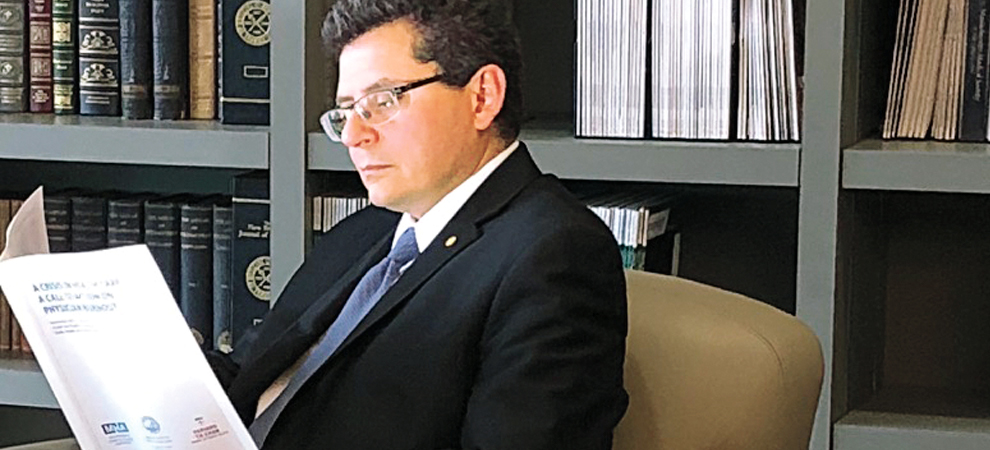By Yael Miller, Director, Practice Solutions and Medical Economics

Just four months ago, A Crisis in Health Care: A Call to Action on Physician Burnout, was released. A collaborative effort of the MMS, the Massachusetts Health and Hospital Association, the Harvard T.H. Chan School of Public Health, and the Harvard Global Health Institute, the white paper was met with a flurry of media attention. In the first month, the Medical Society received more than 10,000 hits to its website and more than 1,700 tweets about the paper. The Harvard School of Public Health’s website received more than 1,400 hits. The report was front page news in general interest publications and trade journals, including the Boston Globe and Medscape, and people spent anywhere from 10 to 27 minutes reading the paper online — a very long time, by internet standards. The report’s reach extended as far as Canada, where Le Journal de Montréal reported on it in French. The message was clear and resonant: physician burnout is a public health crisis.
Next Steps
The Medical Society will continue to raise awareness about physician burnout and the report’s recommendations. Moving forward, the MMS is committed to engaging key stakeholders and making them aware of their responsibility in this crisis, as well as encouraging them to make the necessary changes outlined in the report.
These key stakeholders and their responsibilities are as follows:
Health plans, insurers, and the National Committee for Quality Assurance must streamline or reduce prior authorization (PA) and measurement requirements. Countless studies have shown that PA is taking time away from patient care and adding significant administrative costs to the system. Alternatives to the PA process are real-time approvals and/or “gold card” systems by which providers with high rates of approval are exempt from PA requirements. Furthermore, these stakeholders must reduce the number of measurement requirements that do not directly improve patient care.
State and federal agencies must reduce and/or eliminate physician documentation and measurement requirements that do not directly serve the goals of patient care. On the national level, EHRs should qualify as “certified” only if they can easily extract quality measures and allow for interoperability, usability, and Application Programming Interfaces.
Medical schools and residency programs must actively support self-care and counseling services for trainees, provide adequate staffing during off-hours, and designate mentors who are positive role models for students and trainees.
EHR vendors must collaborate with physicians in the development of systems and implement stronger usability measures, meet quality measure certification standards, and ensure interoperability.
Hospitals, health systems, and provider organizations must take the issue of clinician burnout seriously and address cultural issues that lead to burnout. Clinical workflows should be assessed and improved and EHR systems should be streamlined. Hiring and fully supporting the work of a physician executive leader focused on wellness, such as a chief wellness officer or the equivalent, is one important first step. (Click here for what Atrius Health and Boston Medical Center are doing on this front.)

MMS President Alain Chaoui, MD, reviews the burnout report prior to a television interview. Photo by Yael Miller.
The Board of Registration in Medicine must adopt the Federation of State Medical Boards’ recommendations to help reduce the stigma associated with seeking help for burnout and its consequences.
MMS Advocacy
The Medical Society has been busy advocating for these recommendations in several arenas. The Society’s efforts include the following:
- The MMS has communicated the recommendations about EHRs and prior authorization to the Office of the National Coordinator of Health Information Technology (ONC), which is developing a strategy to reduce the burden of health care information technology and EHRs. The ONC seems to be listening.
- The MMS signed on to a national letter urging the Centers for Medicare and Medicaid Services to include language about prior authorization in its written guidance — specifically that PA causes care delays and negatively affects patients.
- The MMS met with the state’s Quality Alignment Task Force, which is charged with reducing the number of metrics for accountable care organizations (ACOs). The Society called on the task force to decrease the number of quality measures and to align measures uniformly across plans and payment models for local and national payers and government agencies. Choose measures that matter to patients and physicians and can be extracted without inordinate administrative work.
Soon, the MMS is planning to meet with and provide recommendations to other stakeholders, including the state’s Health Policy Commission, that are tackling the issue of costly administrative burdens that don’t add value. The MMS will continue to leverage the report to seek changes to the health care system.
